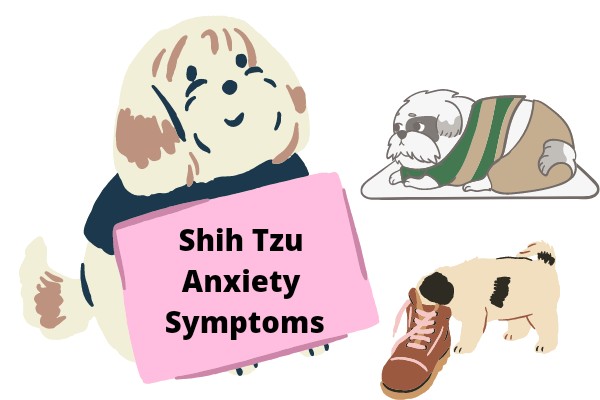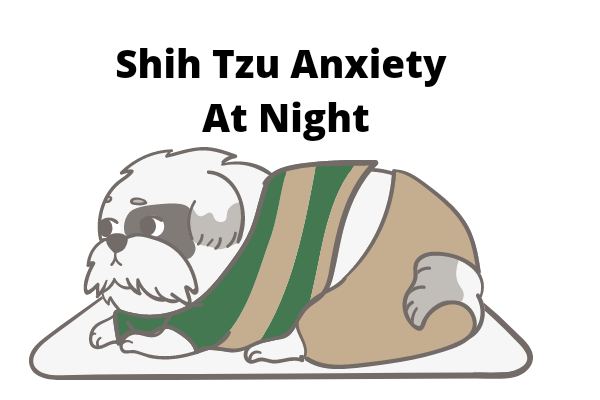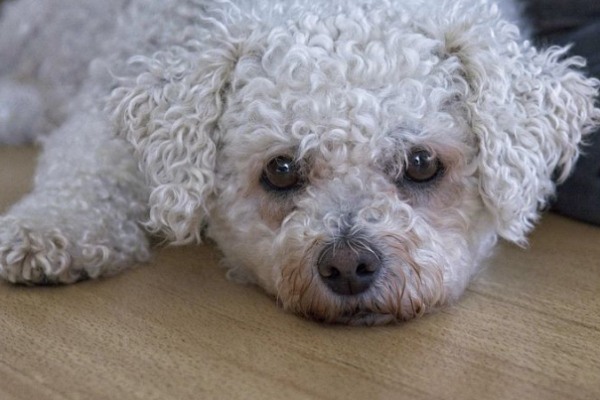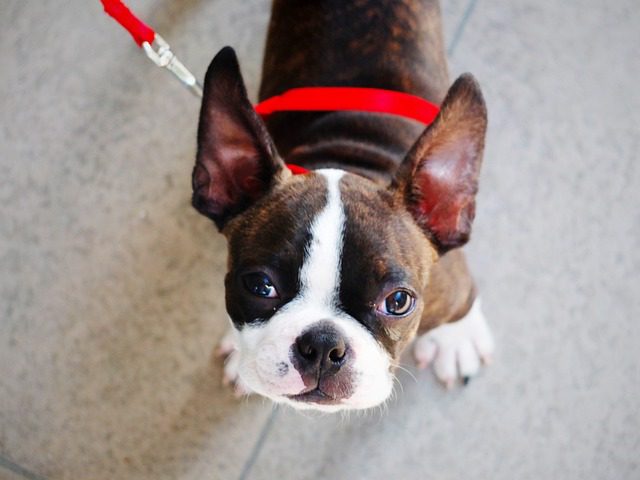14 Shih Tzu Anxiety Symptoms & 11 Anxiety Hacks

Shih Tzus lovers always ask about Shih Tzu anxiety symptoms, this is what this article is all about.
We will be discussing all the common and possible Shih Tzu anxiety symptoms you should know.
As a dog lover and owner who has had experiences with dog anxiety, I will outline some of the ways you can go about with Shih Tzu anxiety.
Before we continue, I must point out one thing. The best way to deal with Shih Tzu anxiety is to avoid and all actions that lead towards anxiety.
That been said, let’s outline and discuss some possible and common Shih Tzu anxiety symptoms you should know.
You can also find out the common reasons why your Shih Tzu bark at night and how to fix it.
Shih Tzu Anxiety Symptoms
Here are some common Shih Tzu anxiety symptoms you should know:
Whining
If your Shih Tzu is anxious or agitated, he may whimper at any chance.
If the stressor is something like loud sounds that your dog can’t get away from, the whining is usually accompanied by pacing.
Otherwise, your Shih Tzu could be sitting about and whimpering for no apparent reason.
It’s most likely stress if your Shih Tzu isn’t whimpering because he has to go outside or is in discomfort.
When dogs are anxious, they often can’t control their whimpering, which is more of an instinctive response.
It is, however, a sign that something in the environment is creating worry in your Shih Tzu. Whining is also a sign of stress.
Shivering
When terrified, many little dog breeds or pets tremble, and the Shih Tzu is no exception.
This trembling is generally accompanied by a tucked tail, cowering, and other stress-related behaviors which is a sign of anxiety so look into it when you notice one.
If something is wrong, and your Shih Tzu is shivering while it isn’t chilly outside or inside then it may be related to anxiety.
Similarly, if you’ve ruled out any medical concerns, then your Shih Tzu is most likely suffering from anxiety.
Shivering is a symptom of uneasiness or worry in Shih Tzu and other tiny dogs.
Barking
Barking is similar to whining in that your Shih Tzu may not always be able to control it, but they’re attempting to communicate with you that they’re worried about something.
It may, however, depend on the situation, since dogs might bark and whine for a variety of reasons.
If you are certain that nothing else is causing your Shih Tzu to bark, you should investigate worry as a possible reason for barking and how to fix it.
Pacing
When your Shih Tzu starts pacing back and forth, it’s an indication that something is bothering them and they can’t relax.
It may not be a huge problem if your Shih Tzu paces back and forth at mealtimes or for brief periods when you are outdoors on a stroll.
If your Shih Tzu exhibits this behavior too often, you may be able to deduce what is causing them to feel anxious.
Tucked tail
Every time your Shih Tzu tail is dragged down, it means she is nervous, uncertain, or afraid.
Your Shih Tzu may just be uncertain when the tail is held just below the topline.
The degree to which the tail is tucked is determined by the level of fear and reinforcement signaled by the body language.
One thing to keep in mind is that if your Shih Tzu’s tail is continually tucked behind its belly, it means your Shih Tzu is terrified.
Freezing
When your Shih Tzu freezes or becomes rigid when you’re with him, it’s a sign that he’s worried about what he’s seeing.
Unnecessary freezing of your Shih Tzu can be very dangerous for both you and your pup.
It’s an indication that your Shih Tzu is stressed out and won’t be able to manage the situation, and the next step might be a bite.
In real life, excessive freezing in tiny breeds such as Shih Tzu is a typical symptom of worry that should not be overlooked.
Licking
Shih Tzus lick just about everything, but excessive lip licking is a typical indicator of stress in Shih Tzus.
If your Shih Tzu is frequently licking their lips, it might be an indication that they are stressed.
Licking their lips and yawning are two more ways your dog attempts to relax, so these behaviors are strong indicators that your dog is anxious.
When your Shih Tzu is anxious, she may lick her lips and yawn. It’s generally a slower lick than when they’re enjoying a tasty treat.
Destructive chewing
As small as Shih Tzus may appear, they still chew things as a sign of anxiety.
To Shih Tzus chewing is a perfectly normal behavior for dogs of all ages. However, it depends on what they are chewing on and why they are chewing.
Chewing for Shih Tzu is a way to combat boredom and can relieve mild anxiety or frustration.
You should keep an eye on your Shih Tzu anxiety level when they start chewing things that are not meant to be chewed.
Growling
Because your Shih Tzu can’t tell you whether it’s upset or uncomfortable using words, it uses growling as a method of communication.
Growling is a common way for your Shih Tzu to express how uneasy he or she is over a period of time.
It might indicate that someone is invading their personal space, that they are feeling intimidated, or that something is bothering them.
It’s not always meant to be aggressive, but it’s typically a sign that your dog is feeling uneasy.
If your Shih Tzu is snarling over food, for example, give them some space, so they may eat in peace.
If they’re snarling at a bone you need to put away, swap them for a lesser reward, so you may securely remove the bone.
Scratching
If you’re certain your Shih Tzu doesn’t have allergies, fleas, or other conditions that may make him uncomfortable and itchy.
As a result, if your Shih Tzu continues to scratch, it might be an indication of tension, which is a symptom of worry.
Hiding
Hiding or escaping action is an extension of avoidance, and some nervous Shih Tzus may hide beneath shelves or behind their humans.
Some anxious Shih Tzus may even nip their owners in order to get its space to move and hide.
Shih Tzus may engage in diversionary behaviors such as digging or circling as a method of escaping when they are caught up with anxiety.
Excessive sleeping
When your Shih Tzu, who normally sleeps for 5 to 6 hours at a time, sleeps for an extended period of time, such as 8 hours in a row, something is amiss.
If your dog’s behavior has suddenly changed, it’s a solid indication that something is wrong with them.
Either they’re not feeling well or they’re suffering from anxiousness.
Aggression
Aggression is defined as aggressive, harmful, or destructive conduct directed towards another person, whether human or animal.
One of the most common reasons Shih Tzus owners seek expert treatment for their pup is because of aggression.
If your normally calm Shih Tzu suddenly becomes aggressive or snippy, it’s possible that they’re reacting out of anxiety.
Aggressive behavior in Shih Tzus is a problem that you should discuss with your veterinarian right away.
Cowering
Cowering is a term used to describe shrinking or crouching in response to anything that threatens, dominates, or dismays you.
As a result, if your Shih Tzu is crouching, especially if it’s accompanied with a tucked tail and shivering, they’re probably scared.
Examine the scenario and your dog’s immediate surroundings to determine if anything unusual is causing your dog to become agitated.
Shih Tzu anxiety at night

Shih Tzu anxiety at night has to do with abandonment, dread of being alone at home, loud sounds, and being near unusual people, youngsters, or other pets late at night are the most prevalent causes of anxiety in dogs.
These can be noticed in dogs that have been abused or neglected as well. The easiest approach to deal with your Shih Tzu’s worry is to figure out what’s causing it.
Some common symptoms of Shih Tzu anxiety at night are:
- Barking
- Whining
- Panting when the owner is going to bed.
- Repetitive or compulsive behaviors.
- Chewing instead of sleeping.
- Urinating or defecating in the house/where they shouldn’t at night
- Shaking or trembling instead of sleeping.
- Following owners around instead of sleeping.
Types of anxiety found in Shih Tzus
Here are the common ways or types of anxiety found in Shih Tzus:
- Confinement Anxiety
- Separation Anxiety
- Noise Anxiety
- Travel Anxiety
- Fear Anxiety
- Hunger Anxiety
- Social Anxiety
- Environmental Anxiety
Also, see some common pros and cons of owning a Shih Tzu.
How to fix Shih Tzu anxiety
Here are some ways to fix Shih Tzus anxiety problems:
See a veterinarian
The best way to help any Shih Tzus to overcome any type of anxiety is to consult your vet.
Talk to your vet as soon as you notice the signs we have listed in this post.
See a dog behaviorist
In the event of not being able to see a veterinarian, you can look for an animal behaviorist within your city.
Keep your Shih Tzu busy
Do not leave your Shih Tzu alone for an extended period of time.
Make sure they have access to many interactive toys before you go.
A food-filled kong is helpful for keeping them stimulated.
Create stress-free environment
Make a comfortable area for your dog to relax in. Ideally, you should use the same bed, blanket, or mat every time you visit a potentially stressful area and bring it with you.
To help your dog connect the mat with relaxation, reward relaxed actions on it regularly, even when stress levels are low.
This provides them with a secure haven to retreat to when they leave the house, go to the vet, or encounter anxiety triggers.
Desensitize your Shih Tzus
Desensitizing Shih Tzus to the ‘triggers’ that create anxiety is one method to make them feel less anxious.
Therefore, invest a chunk of time in desensitizing your Shih Tzu as you stand to benefit more.
Exercise and play with your Shih Tzu
Providing various stimuli, releasing energy, and socializing with other dogs keeps your Shih Tzu’s brain occupied.
If your Shih Tzu is naturally energetic, engage in certain sports with them, such as agility training.
You’ll both improve your bonds, and it’ll be good for your and their health.
However, be careful when you play with your Shih Tzus as they are prone to overheating and can have breathing difficulties, due to their short nose.
Establish a daily routine
Establish a walking, gaming, and eating schedule. Your Shih Tzu will be more relaxed since he will know what to expect at all times.
This means most of the time your Shih Tzu will have something doing and will never get bored.
Counter conditioning
Counter conditioning entails teaching your Shih Tzu to view triggers or stresses as positive rather than negative.
Give your Shih Tzu something pleasant to do when the trigger occurs, so they look forward to it rather than fearing it.
Invest in some antianxiety products
You can always invest in some antianxiety products which can help your Shih Tzu with anxiety issues.
Here are some common antianxiety products:
- Dog anxiety jacket
- Dog-calming collar
- Antianxiety beds
Offer unconditional massages
Sometimes all your dog needs is a little care to unwind. Massages to the ears and forehead can also help your dog relax.
Invest in more treats and toys
Shih Tzus like licking, so providing them with something nutritious to lick keeps their minds engaged and helps them relax.
Invest in mental stimulation toys for your Shih Tzu.
Read more about: Do Shih Tzus Bark A lot: 13 Causes of Shih Tzus Barking & Solutions.
I hope your question about Shih Tzu anxiety symptoms was answered to your understanding!!!


![What Do Shih Tzus Usually Die From [10 Things] What Do Shih Tzus Usually Die From](https://petcreeks.com/wp-content/uploads/2023/04/What-Do-Shih-Tzus-Usually-Die-From-768x555.jpg)

![How to Prevent Ear Infections in Dogs [15 Helpful Hints] How to Prevent Ear Infections in Dogs](https://petcreeks.com/wp-content/uploads/2023/09/pexels-mikhail-nilov-7474856.jpg)

![Head Trauma in Dogs [Signs, Causes & Treatment] Head Trauma in Dogs](https://petcreeks.com/wp-content/uploads/2023/12/pexels-mikhail-nilov-7469230.jpg)